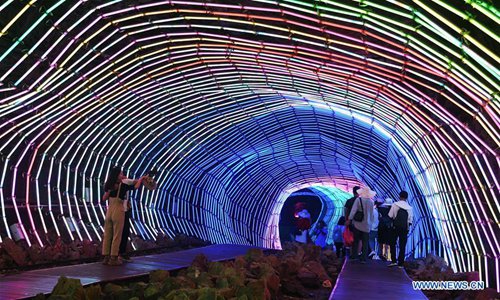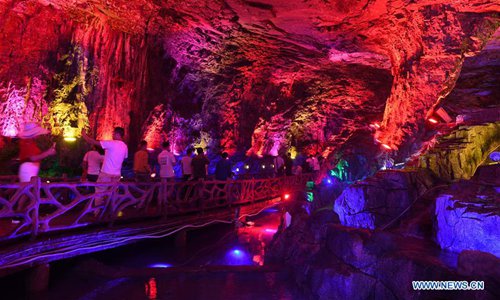Tourism booming during National Day holiday in SW China's Guizhou

Visitors take photos at the Cinnabar tourism town in Wanshan District of Tongren, southwest China's Guizhou Province, Oct. 5, 2019. The tourism of the town is booming during the National Day holiday. The Cinnabar town has been remolded and developed from an abandoned mercury mine relics by local government since 2016. Mercury was used in ancient China for making cinnabar, or mercuric sulfide, an important ingredient in the ancient production of paints and in the alchemic pursuit of an "immortality elixir." (Xinhua)

Visitors walk through a tunnel transformed from an abandoned mine at the Cinnabar tourism town in Wanshan District of Tongren, southwest China's Guizhou Province, Oct. 5, 2019. The tourism of the town is booming during the National Day holiday. The Cinnabar town has been remolded and developed from an abandoned mercury mine relics by local government since 2016. Mercury was used in ancient China for making cinnabar, or mercuric sulfide, an important ingredient in the ancient production of paints and in the alchemic pursuit of an "immortality elixir." (Xinhua)

Visitors walk through a tunnel transformed from an abandoned mine at the Cinnabar tourism town in Wanshan District of Tongren, southwest China's Guizhou Province, Oct. 5, 2019. The tourism of the town is booming during the National Day holiday. The Cinnabar town has been remolded and developed from an abandoned mercury mine relics by local government since 2016. Mercury was used in ancient China for making cinnabar, or mercuric sulfide, an important ingredient in the ancient production of paints and in the alchemic pursuit of an "immortality elixir." (Xinhua)

Visitors walk on a plank road built on the cliff at the Cinnabar tourism town in Wanshan District of Tongren, southwest China's Guizhou Province, Oct. 5, 2019. The tourism of the town is booming during the National Day holiday. The Cinnabar town has been remolded and developed from an abandoned mercury mine relics by local government since 2016. Mercury was used in ancient China for making cinnabar, or mercuric sulfide, an important ingredient in the ancient production of paints and in the alchemic pursuit of an "immortality elixir." (Xinhua)